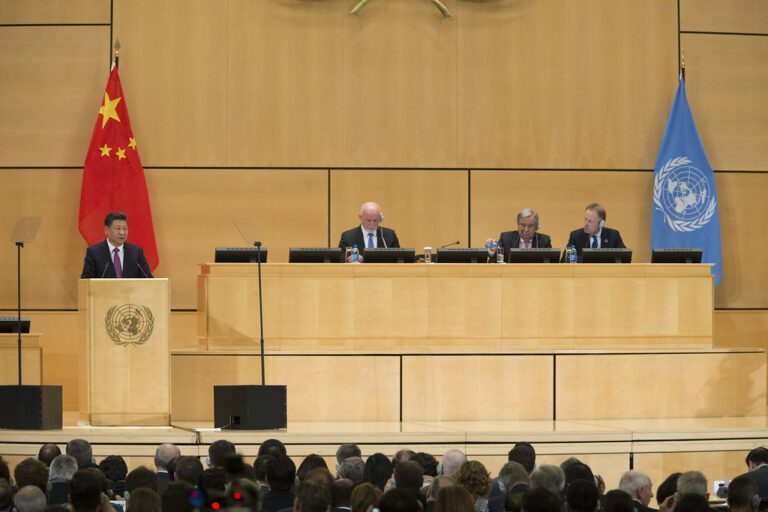China’s Economic Influence Impacts Governance and Climate Policy in CEE

Long-lingering concerns about Chinese influence at the EU’s doorstep have recently become a harsh reality.
Montenegro has become a symbol of the debt problems developing countries can fall into by signing on to a large-scale infrastructure project with China. The Balkan country accepted a Chinese loan worth $1 billion or one-fifth of its GDP in 2014 to build a highway and it is now struggling to repay it. The government has recently begged the EU for help. The road is still under construction and there are doubts about its real benefits for the local economy.
China’s active debt diplomacy is part of a long-term process of growing Chinese economic influence on the European continent, which has had a strong negative impact on governance in Central and Eastern Europe (CEE), and especially the Balkans. The combination of democratic backsliding, widespread state capture practices, and the weakening of the EU gravitational pull in the region have opened gaps, which are exploited by authoritarian states such as China and Russia.
Some Western Balkan countries have welcomed Chinese investment as an instrument for long-term economic development. The welcome was extended in large part due to the perception of a lackluster commitment by the EU to provide the necessary financial resources and political capital for boosting the regional economy. This is combined with a battle of narratives in which China-friendly countries such as Serbia downplay the EU’s contributions while amplifying Chinese assistance and investment.
China has increased its economic footprint in CEE through its flagship Belt and Road Initiative, and the 17+1 (16+1) cooperation mechanism between CEE countries and China. This has been one of the reasons why the EU has adopted a more assertive position vis-à-vis China, calling Beijing a “systemic rival” and strengthening its defensive mechanisms against Chinese influence in critical sectors.
Chinese investment in the CEE has focused mainly on the transportation, energy, manufacturing and telecommunications sectors. Financial flows have come not only in the form of FDI, but also as grants, development loans, mergers and acquisitions of local assets, and concession agreements worth some $14 billion since 2009.
Yet, the growing Chinese investment activity has so far not translated into a more visible presence of large Chinese companies in the region. In 2019, less than one percent of the total turnover of the economy in CEE countries was controlled by Chinese firms.
Corruption as a Comparative Advantage
Chinese firms have often taken advantage of and even exacerbated weak governance standards in the region, while corrupt governments in the region have prioritized deals that enrich oligarchic networks surrounding them. State capture practices, such as the lack of transparency and competition in public procurement and the disregard for environmental and technical standards have provided Chinese companies with comparative advantage.
An apt example of how China leverages state capture networks is the project for the expansion and modernization of the Budapest-Belgrade railway and the construction of the Kichevo-Ohrid highway in North Macedonia. Chinese contractors often receive preferential treatment in public procurement tenders and find themselves as sole bidders for projects worth billions. They also receive direct political and financial support from the Chinese government utilizing loan facilities from Chinese state-owned banks. Local political elites prefer these unconditional loans to EU funding, which requires structural reforms and better governance. Chinese investment thus reinforces the status quo and benefits the oligarchic power structures that are averse to increased competition and transparency.
Chinese projects have also hurt the public finances of countries in the region. The decision to take a Chinese loan usually lacks a solid cost-benefit analysis and any meaningful public debate. The two most indebted countries to China in the region are Montenegro, where the debt exposure to China as a share of GDP reaches 18.5 percent, followed by Bosnia and Herzegovina, where it stands at 16.1 percent.
A Setback in the Green Transition
Chinese economic influence has contributed to a host of governance failures, particularly in the Western Balkan countries. In this region, governments have delayed the energy transition, have not complied with European environmental standards and have increased their dependency on coal. In the Western Balkans, about a quarter of Chinese projects are coal or heavy-industry-related.
Only 14 Chinese projects out of 80 analyzed in CEE are low-carbon. China’s domestic problem of industrial overcapacity, which is one of the main drivers of the Belt and Road Initiative, has incentivized the construction of overseas projects where excess capital and labor are earmarked, regardless of their environmental impact. Many bilateral loans are conditional on the exclusive use of Chinese equipment or the hiring of Chinese contractors.
In addition, the region has the largest reserves of lignite in Europe, which is a cheap but highly polluting source of energy. China has invested in the refurbishment of lignite-fired power plants in countries such as Bosnia and Herzegovina, Serbia and North Macedonia, thus expanding these countries’ dependence on this polluting energy source.
Taming the Dragon
To reduce the negative impact of the growing Chinese presence, there is a need for a robust EU and also US response using a range of economic tools for building the foundations for a low-carbon economic development. The EU should enhance its role as the main driver of economic growth in CEE by closing the financing gap for the implementation of strategic development projects, in particular those related to energy transition. To ensure the implementation of the EU energy and climate acquis in the Western Balkans, the Energy Community should be empowered with a stronger regulatory role and capacity to enforce European energy and competition rules.
The development of regional investment initiatives, such as the US-led Three Seas Initiative (3SI), aimed at strengthening the region’s attractiveness to constructive capital and resilience to corrosive capital inflows, should be prioritized. The EU also needs to push the Western Balkans countries to improve governance standards and implement screening of Chinese investments.
Furthermore, the EU should continue reassuring the Western Balkan countries of their European future, but it should also demand that governments in the region commit to closing governance gaps that have been exploited by domestic and foreign-backed state capture networks to take control of strategic economic sectors and lucrative assets. In addition, the Western Balkan countries should be included in the EU rule of law mechanism and the disbursement of EU funding should become conditional on the improvement of governance and the effectiveness of anti-corruption policies.
Yet, the future accession of the nations of the Western Balkans in the EU is not supported with the same commitment by all EU member states. Moreover, even with worrying examples of Chinese influence encroaching the financial sovereignty of countries such as Montenegro, Western Balkan governments might still prefer the short-term benefits of China’s unconditional loans rather than EU funding that comes with strings attached. The EU should not only offer economic incentives to the Western Balkans, but also recover its soft power in the region that the EU once wielded to catalyze positive changes in the pre-accession period of many current EU members.
Written by
Martin Vladimirov
Martin Vladimirov is the Director of the Climate and Energy Program at the Center for the Study of Democracy. He is the co-author of the Kremlin Playbook series on the Russian economic influence in Europe.
Javier Borràs Arumí
jborrasarumiJavier Borràs Arumí is a Research Associate in the economic program at the Center for the Study of Democracy.


